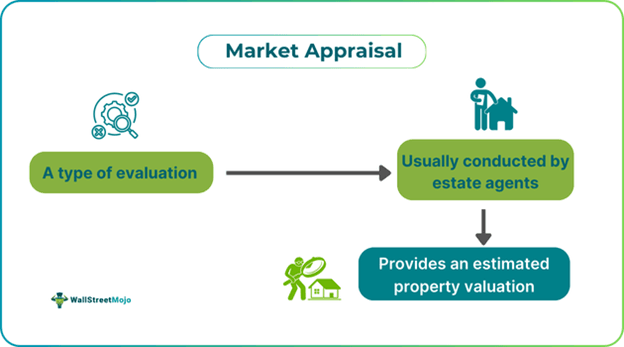Table of Contents
Market Appraisal Definition
A Market Appraisal is a type of assessment usually conducted by a real estate agent on a property. It helps provide an approximate market worth of the property. The determined market value is based on various factors, such as the physical condition of the property, its location, age, size, nearby amenities, and construction.

A market appraisal is generally suggested when purchasing, selling, or refinancing a real estate asset. It is essential to ensure that the property is fairly priced since the value of real estate fluctuates significantly with market conditions. As a result, this appraisal is a significant process in such transactions.
Key Takeaways
- A market appraisal is a type of property assessment that a real estate agent generally performs. It can lead to an estimated market value of a property.
- The established market value is dependent on a number of aspects, including the property's physical condition, location, age, size, neighboring conveniences, and design.
- An appraisal ensures that a property is valued accurately. It also enables buyers, sellers, and funding agencies to make educated choices.
Market Appraisal Explained
A Market Appraisal is a third party's assessment of a property's current condition and market worth. In a buy-and-sell process between the purchaser and the seller, an appraisal can assist customers in determining whether the asking price for the property is reasonable. It is based on several criteria, such as the property's condition, location, and other attributes.
Differences between the purchaser's and seller's evaluations may exist. As a result, a market appraisal process is employed to resolve this disagreement, and a market price on which all parties can agree is established. If a property is refinanced, banks must ensure that they are not offering a higher sum than the market value. Banks must ensure that there is no inaccurate estimation because the property acts as collateral for them. As a result, the appraisal process plays an essential role in determining the worth of a property.
Components
The components of market appraisal for property are as follows:
- Introduction: This section outlines the objective of the appraisal, specifies the asset being assessed, and discusses how the appraiser adhered to industry norms and procedures, the quantity and quality of rooms, and distinctive features.
- Asset Description: This component provides information on the property, including its size, age, location, and structure.
- Assessment and Appraisal: In this component, the appraiser provides their perspective on the property's worth. The appraiser evaluates several techniques that employ a range of information to assess the property's worth.
- Conclusion: The final component comprises the appraiser's general conclusion on the property's worth and indicates any restricting factors that were established in the appraisal.
Factors
Some market appraisal factors include the following:
- Position: A property's position has a significant impact on its worth due to aspects such as demographics, neighboring facilities, and economic prospects.
- Quality: A property's physical state can affect its worth. Properties in properly maintained conditions are often more valuable than those in a poor state.
- Unique Characteristics: A property's distinctive characteristics, which are not found in other properties in the region, might raise its price.
Examples
Let us go through the following examples to understand market appraisal:
Example #1
Let us assume that Jane wants to sell a property. She hired a real estate agent to conduct the entire process on her behalf. The agent gave her an estimate of the cost of her property based on similar properties in the area where Jane’s property is located. The estimate indicated an approximate market worth of the property, not its actual and accurate market value. This is a market appraisal example.
Example #2
Philomena Asante was astonished when she received the appraisal for her property, which she bought a year and a half ago. The appraiser performing her mortgage refinance determined that her property was valued less than she paid for it. He evaluated it for $350,000, which was $23,000 below what Asante paid. Asante, a Black woman, claimed she faced discrimination. According to information received from the state board through a public records request, four appraisal discrimination allegations, including Asante's, were submitted for prosecution in the last five years. The accusations caused disciplinary measures ranging from canceled licenses to penalties. This is another market appraisal example.
Importance
Market appraisal for property is essential for several reasons. For instance, if a purchaser pays more for an estate than it is actually worth, the lender will be unable to get back the entire amount after foreclosure. In the same way, a seller may be at an economic disadvantage if they undervalue their property. As a result, an appraisal helps verify that a property is correctly priced. It allows purchasers, sellers, and financiers to make informed choices.
Market Appraisal Vs. Valuation
The differences are as follows:
Market Appraisal
- They provide general estimations of a property's market worth.
- These evaluations are usually performed by estate agents and provide an idea of the area's average selling prices instead of the best-selling price.
- The agent's motivation is different. Since they work with high volume, selling an asset promptly to earn higher commissions sometimes results in reducing the price to close the deal.
Valuation
- A valuation is performed by an expert with the necessary professional experience to generate a reliable data-based market valuation determined by the property's condition and local expertise.
- It is usually needed by the purchaser who is considering buying a property.
- This assessment provides individuals with comprehensive details about the property, allowing them to decide whether it is worth buying. It also helps with obtaining loans and insurance.
